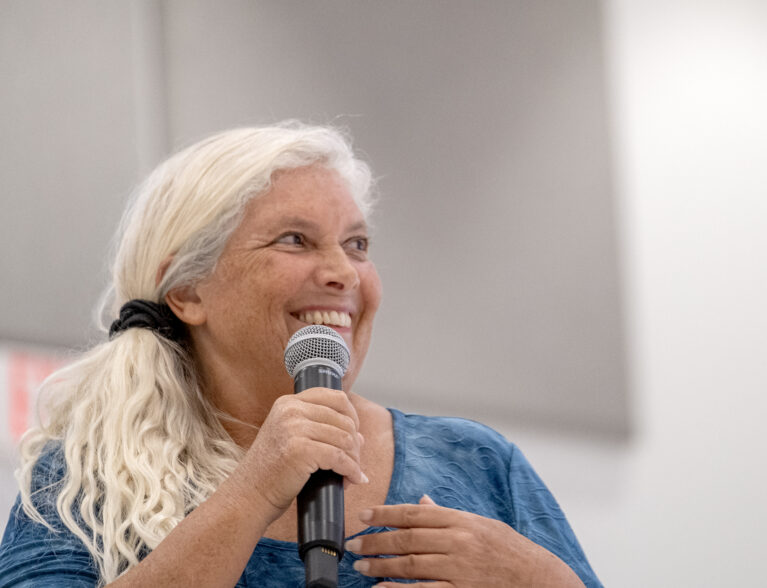
Write-in candidate Deborah Cooney, whose bizarre accusations of rampant police misconduct are at the core of her campaign for sheriff, last week offered to withdraw from the race – a move that could open the Republican primary election on Aug. 20 to all of our county’s 117,000 registered voters.
Her withdrawal from an election in which Cooney stands no chance would allow some 58,000 of these voters – who as things stand, will have no voice in the choice of our sheriff for the next four years – to participate in this critical primary.
But before you heave a sigh of relief over the prospect of Cooney doing the right thing, there is a catch.
She said she would withdraw from the race only if Fellsmere Police Chief Keith Touchberry, who is also running for sheriff, embraces her offer of support, and according to emails she sent to him last Wednesday and Thursday, signs a written contract accepting her conditions.
“In order to do this,” Cooney wrote in her June 19 email, “I would need some concessions from you.”
Needless to say, Touchberry showed no interest in her proposal.
In the email, Cooney stated that she is an “advocate for justice” and, in exchange for her endorsement and backing, wanted a commitment from Touchberry to “show some compassion” for victims of what she described as a Sheriff’s Office “mafia.”
Other concessions could be addressed in a face-to-face meeting at which she and Touchberry would negotiate the terms of her withdrawal, which she claimed would be a “huge boon” to his campaign.
Praising Touchberry’s performance two Mondays ago in the Taxpayers Association-sponsored candidate debate at Indian River Charter High School, Cooney urged him to schedule the meeting at his earliest convenience.
“You are facing a tight time constraint before the August primaries,” she wrote.
Twenty-four hours later – having not received a response – she sent a follow-up email warning that the “window of opportunity is very small,” because the county’s Supervisor of Elections Office already was preparing to print ballots for the primary.
She also added another demand.
“I will not withdraw without assurances from you,” Cooney wrote, “sealed by a written contract.”
She’s not getting one.
In fact, Touchberry said Monday he doesn’t plan to meet with her, or even acknowledge that he received her emails. Instead, he forwarded them to Supervisor of Elections Leslie Swan.
“I’m not going to say or do anything that could affect her decision one way or the other,” Touchberry said. “I’m trying to do the ethical thing. It shouldn’t be up to me to determine whether the primary is open or closed.”
It shouldn’t be up to Cooney, either.
But it is.
Under Florida law, only registered members may vote in their party’s primary elections, unless there is no outside candidate. Then, the primary is open to all county voters.
In counties where one party dominates local elections – as is the case here, where Republicans regularly populate the ballot and candidates from the Democratic Party and with no party affiliation are rare – some party outsiders temporarily change their registration to vote, usually motivated by a specific race.
As the week began, Swan said nearly 400 county voters had switched their registrations to Republican since April 1, presumably to participate in the sheriff’s primary, where Touchberry is running against incumbent Eric Flowers and the agency’s former deputy chief, Milo Thornton.
For many non-Republican voters, however, changing their party affiliation is an inconvenience. For others, particularly some loyal Democrats, it’s an indignity they refuse to endure.
County voters have until July 22 to make the change, which Swan said can be done online, for the coming primary.
There’s a twist to Cooney’s candidacy, though, one that exposes the inanity of at least one aspect of the state’s election laws.
Write-in candidates aren’t required to pay a filing fee or collect signatures on a petition to qualify to run. They simply need to be an eligible county voter who isn’t a convicted felon and fill out a few forms.
Their presence in these races, however – even though their names do not appear on ballots – can close primaries and prevent thousands of voters from participating in important local elections.
That’s happening now in our county.
Nearly half of the county’s 117,000-plus registered voters are being shut out by a write-in candidate who clearly lacks the law-enforcement credentials needed for the job, can’t be taken seriously and has no realistic chance to win.
Yet, as she did four years ago, when she ran with no party affiliation and lost to Flowers in an landslide election, Cooney again denied that she’s responsible for closing the primary.
She believes the three Republican candidates must “share the blame,” because they could have chosen to run as Democrats or independents.
That doesn’t make sense, of course, but the same can be said of much of what drives her campaign.
Anyone who attended the debate last week heard Cooney continue with her allegations that the local law-enforcement community – especially the Sheriff’s Office, but also including prosecutors, judges and attorneys – poses the greatest threat to our county.
She claimed the law-enforcement establishment here is essentially a mafia that operates a drug-dealing ring, and she accused the Sheriff’s Office of murdering people.
Her remarks were alarmingly similar to her narrative four years ago, when she repeatedly referred to a law-enforcement-run “drug cartel” that pushed illegal narcotics on the county’s Black population, entrapped and busted users, and then forced them to “do the cartel’s bidding.”
She also described police unions as “mafia protection rackets,” and said that, if she were elected sheriff, her agency would “pay reparations to the victims of crimes perpetrated by our deputies, because that is just.”
Also disturbing is her troubled past, which raises doubts about her fitness for such a demanding position.
Cooney was arrested twice in this county – on a misdemeanor trespass charge in 2014, then a felony charge of aggravated assault with a firearm in 2015. The State Attorney’s Office eventually dropped both charges, but only after lengthy legal battles.
Twice during the trespass case, her attorneys withdrew, including a Public Defender’s Office lawyer who claimed Cooney’s “allegations and conduct” caused such “adversity and hostility” that it created a conflict that prohibited him from representing her further.
Prior to his withdrawal, the attorney had successfully petitioned the judge to order a mental competency examination.
The felony case was based on allegations that Cooney, during an argument with a couple that was reportedly renting a room at her Vero Beach home, pulled a gun and threatened them.
Cooney represented herself in court, where she rebutted the charge, arguing that the couple had “unlawfully and forcefully” entered her home and was working in tandem with the Sheriff’s Office to install a methamphetamine lab and distribution operation on the property.
As the case progressed, Cooney requested that Circuit Judge Cynthia Cox be disqualified, alleging bias and questioning her competence. She also sought a change of venue, citing the Sheriff’s Office’s “close professional ties” to prosecutors and judges here.
Cox denied the motion to disqualify herself.
Cooney’s mother became so concerned about her daughter’s “mental competency to make the right decisions in court” that she wrote a letter to Cox, asking the judge to order a psychiatric evaluation.
“Her father and I, family members and friends have observed paranoia, delusion and irrational behavior for some years now,” Cooney’s mother, Constance Newman, wrote in her October 2016 letter.
Newman cited Cooney’s “inappropriate behavior toward people who smoke,” fear of “radiation from cell towers and smart meters,” and worries that legal authorities in Florida “will kill her.”
She wrote that neither she nor Cooney’s father were able to convince her that she needed psychiatric help.
But Newman convinced Cox.
After ordering the evaluation and reviewing its findings, the judge declared Cooney “incompetent to proceed” with the case due to mental illness and ruled that the defendant met the criteria for “secure involuntary placement” in a mental health treatment facility chosen by the state Department of Children and Families.
Cooney was eventually released and, 18 months after her arrest, prosecutors dismissed the case. That was in April 2017.
Three years later, she ran for sheriff and, in the general election, received only 20 percent of the vote. Now, she’s running again, and her mother, reached by phone last weekend, said she believes her daughter is “very capable of making decisions.”
Let’s all hope so.
Let’s hope she makes the right decision now – the best decision for our community, where everyone should get the opportunity to vote in the sheriff’s election before it’s too late.
But don’t count on it.
If you’re not a Republican and want a say in who wins the sheriff’s race, you’ll probably need to change your party affiliation.
Photos by Joshua Kodis
- Deborah Cooney
- Deborah Cooney
- Deborah Cooney
- Deborah Cooney
- Deborah Cooney
- Sheriff Eric Flowers
- Sheriff Eric Flowers
- Sheriff Eric Flowers
- Eric Flowers
- Keith Touchberry
- Keith Touchberry
- Keith Touchberry
- Milo Thornton
- Milo Thornton
- Milo Thornton
- Milo Thornton
- Milo Thornton




















